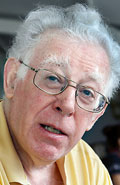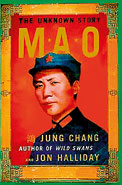In Wild Swans Jung Chang credits her husband Jon Halliday (they married in 1991), the writer and historian as being indispensable to what made Wild Swans work. After its huge success, they began writing Mao: The Unknown Story and in a brief interview, Halliday sat down to outline some of the aspects that went into the book.
 |
| Jon Halliday |
It was, he concedes, the most challenging of all his books. "We had to do a huge amount of research. It was very difficult getting things done in China. The other main place was Russia..we found the answers to the questions to which there had not been full answers there. We also worked in difficult places like the Albanian archives. It was great fun but it took a lot of time."
That they had to deal with a man Mao Zedong and an institution, the Chinese Communist Party which had spent decades constructing a story of both the man and the party and that systematic campaign of misinformation took a while to dismantle, he adds.
They conducted many interviews- Wild Swans opened a lot of doors, he says. By and large people were very helpful. Mao's widows were happy to talk to Jung. But also in China talking about Mao, was against the Constitution, so they spoke about incidents. Interviews can be important but they are nothing like as important as the documents, he says. In some part the interviews showed how Mao related to a particular person. He was very manipulative- extremely smart at getting the upper hand in exchanges, Halliday comments.
"In our opinion he got the upper hand with Kissinger (US Secretary of State, Henry) and even Nehru (Independent India's first Prime Minister). Nehru had four big conversations with Mao in October 1954. Mao liked to find weak spots. At one point, he brought up the atomic bomb, knowing that Nehru was basically a man of peace. Some of what Mao said to Nehru has been known for some time and I always wondered what did Nehru say? We interviewed the man who was the interpreter for Nehru (he spoke beautiful Chinese) and I asked him what did Nehru say? And he said 'Nehru didn't say anything'. So by not dealing with it Mao captures the stage.
"One of the Russians said, ‘Mao was very heavy. We tried to steer away from him, to avoid him'. I also feel that in his rise to power, this was an important characteristic. He made people around him feel, this guy Mao is trouble. If I cross him, he's going to come after me and win.”
They interviewed another dictator President Mobuto of Zaire who in Halliday's opinion, spoke 'dictator-speak' and understood Mao much better than the Western leaders.
The book generated both positive reviews as well as its share of criticism, but Halliday has no regrets. "On the whole we have shifted the terms of the debate and certainly the level of knowledge available. A historian in America wrote a review saying we have changed the paradigm. Now I think many more people will say you can compare Mao with Stalin, which I think is the best comparison because they are both Communists."
"When people think Mao they don't think of Mao like Stalin. First of all the archives aren't open. When Communism fell in Russia, people said I think so many people died in the Gulag, in the famine..now you can document the whole thing. It's impossible to deny. But the Chinese archives are not open so that sort of documentation is not available. We got all the facts but people can still argue."
A former Senior Visiting Research Fellow at King's College, London, Halliday's other books largely reflect his field of interest - books on Korea, Albania (The Artful Albanian: The Memoirs of Enver Hoxha), China, Japanese Imperialism Today and one on film maker Douglas Sirk. Intriguing among these is a title, 'The Psychology of Gambling' and Halliday obligingly fills us in on the origin of this particular volume which takes him back to growing up in southern Ireland in a world that was full of horse racing, gambling and card playing on his mother's side (his father was English).
"It was very social, they all loved getting together and having a drink. Of course it contained the risk of losing a lot of money. But I could see the power of gambling, I could sense the lure," he laughs. The book is a collection of essays,even one about Dosteovosky and gambling! It's a social phenomenon. It's under study in every country, he adds.
The book he's working on now has to do with Russia and China in the 20th Century but there's no time to elaborate. He has to rush. To Galle. |



